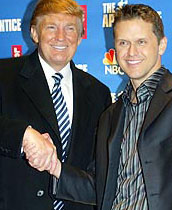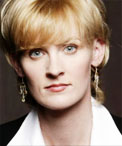May 31, 2005
FeatureThe Apprentice: Still Hitting the Glass Ceiling
We've just concluded the third season of a formerly great show, and critics are saying the season went out with a whimper, even though something unprecedented has happened: Donald Trump's new apprentice is a woman.
| We should have noticed that right off the bat, in the brilliant first season, when the teams were divided into girls versus boys as if they were fourth-graders instead of successful adults. |
And we may hearken back to that first season, because it really was brilliant. I can't explain why exactly, but all of the pieces just came together to form something truly awesome, a show you could both mock and get wrapped up in. Given that the first season was Trump's ticket back into the mainstream, when it started, he still had some kitsch value, and it was kind of neat to see him on TV again. Because, you know, he wasn't on the screen every 10 seconds like he is now. (When he's not spouting superlatives about his show or his properties, he's stumping for Visa or Domino's Pizza, or he's lobbying to have the Twin Towers rebuilt … plus one floor, of course. They'll be yooge!) Add to that some explosive personalities — Omarosa and Heidi — and some people you could really root for — Amy, Bill, Troy, and Kwame — plus challenges that used contestants' brains rather than their pretty bodies, and you've got television gold, as far as I'm concerned.
 Trump loves militaristic blowhards. |
Season 3 started out much worse. It seemed like we really just got the bottom of the barrel here, as if these folks were just Season 2's leftovers (including another guy with bow ties). We finally got rid of the boys vs. girls thing, so I thought we were making some progress. And Book Smarts vs. Street Smarts did seem like an interesting premise — the first 80 times it was mentioned, anyway. But then, why not get actually brilliant people? We've had Harvard and Yale and Wharton graduates, people with MBAs even, on previous seasons. There was not a single Ivy League diploma among the Book Smarts team, which — and I'm not being elitist here, because my degree is from a Big State University — seems like it wouldn't really prove the point. I mean, why didn't we do this in Season 2 with people like Jen M., who had, like, 16 degrees?
But I've strayed far from the point, which is basically that we finally get to the place where we're not so focused on pitting gender against gender, and yet the premise is still just as artificial. Tana, the great hero of the Street Smarts team, was a mere 28 credits short of her degree. This is hardly a pure experiment.
But, so, the sexism. As the show has degraded in quality, the sexism has become subtler, so I guess that's progress. But let's consider:
- In Season 1, the women's team was victorious through the first few tasks,
basically wiping the floor with the men, results-wise. They won by selling
themselves. In the very first task, the ladies managed to accumulate money
by offering kisses with their lemonade. Time progressed, and the skirts
got shorter. In a later task where each team had to basically go on a scavenger
hunt through Manhattan to get the best prices on a list of items, the women
unabashedly flirted their way to victory. It got so bad, in fact, that Trump
himself told the women to dial it down.
- In Season 2, the cattiest women on the planet were rounded up and made
to live together, such that we got kind of a hybrid of The Apprentice
and The Real World. The women's team fought and spat and made fun
and pretended to be friends while hating each other. The whole thing was
nauseating, and the worst part of it is that the women started making these
great, sweeping generalizations about how awful women are in business situations.
So, fabulous. We're sending the message to most Americans that women shouldn't
be in business because they're catty bitches.
- Also in Season 2, there was one switcheroo during the first episode that
sent a man to the women's team and a woman to the men's team. Pamela was
sent to the men's team and basically proceeded to piss everyone off. Yeah,
she was a little dorky and pretentious, but she had a good head on her shoulders.
The men, very clearly threatened by a strong woman, sent her packing back
to the women's team, at which point a losing women's team that couldn't
stop fighting long enough to get their act together actually came within
$10 of winning a task under Pamela's leadership. And yet Pamela? "You're
fired!"
- The whole series, but especially Seasons 2 and 3, is populated by men who do not respect women. Kelly, Season 2's victor, is a good example of that; during a task led by Elizabeth, he was generally disagreeable and would not listen to a single one of her ideas, and then everyone accused her of being wishy-washy when, in actuality, she had a clear plan but none of the men on her team would listen. In Season 3, we have John, who had to get musicians to participate in the "experience" auction with Erin and Stephanie in tow. In a blatant display of machismo, John arrogantly took over every celebrity meeting and wouldn't let Erin or Stephanie get a word in edgewise. He also basically whored both women out to Gene Simmons (which, ew) and referred to them as bitches. He had the nerve to be shocked when the task was lost, and blamed Erin and Stephanie for not speaking up more, but it's kind of hard to do that when you won't let them. The only way they would have accomplished anything would have been to have bound and gagged John and put him in a dumpster.
The inherent sexism of the candidates, though, is not really the show's problem so much as it is the contestants', and we continue to see it because it makes for good television, allegedly.
What's really problematic is Trump's sexism, and nowhere is it more obvious than in the recent finale.
 Smart, talented, pretty, and kind of awesome. |
So that's bad enough. Now we're down to Tana and Kendra, right, so Trump has to pick a woman. The men on the show this season were a special brand of appalling (and they all kind of looked the same; I had trouble telling them apart), so that's really as it should be. We'll forget that Kendra — of the now legendary Pontiac task victory, and the final task that was so successful hardly any of it was shown on TV — is the clear victor over Tana, whose leadership strategy was to mock her team openly rather than actually lead them. That's kind of irrelevant at this point, because we've all known for at least the last two weeks that the winner of The Apprentice would be a woman.
| So thanks, Donald, for bringing us to the blue and pink aisles at Toys "R" Us. I'm kind of surprised it wasn't the finale's corporate sponsor. |
But wherefore art thou, sexism? Despite his penchant for pink ties, there's something very Good Ol' Boy about Mr. Trump. His reign in the '80s implied a macho, Gordon Gekko brand of business savvy. Women arrive in the workplace with big shoulder pads and neck scarves, and the equation changes, but not really, because if I learned anything from Melanie Griffith, it's that the only reason to succeed in business is to nail Harrison Ford. Um, anyway. So '80s movies don't really teach us much about how the corporate world actually works, especially not now, but I think they kind of reflect our perceptions of what working in that sort of environment would be like. That perception is again reflected on The Apprentice, glass ceiling and all, even with a female winner.
So what happens when you introduce successful women who defy the odds? We'll find out when the Martha Stewart version of the show comes on the air. I don't have high hopes, though, because apparently for women, defying the odds means staying in the box. Yes, Ms. Stewart has built an empire (and spent some time in jail - which makes her tougher, right?), but what is she known for? Turkeys and tea cozies. That's right, ladies; you, too, can succeed in business if you build a business around, you know, "women's work".
| Professional women don't behave that way. Then again, professional women also don't audition for reality TV shows. |
It prompts the question, though: Would an Apprentice sans sexism, with people chosen solely for their resumes, still make for compelling TV? I think yes, because one of the things that I like about this show that I dislike about other reality TV is that the tasks are based on skill sets that require the use of one's brain over brute strength or beauty (theoretically). And yet, we face the same paradox every successful reality TV show faces: the problem with casting for later seasons of a successful show is that would-be contestants know what they're in for, so only certain types will audition. And the types of people who audition are probably the self-made folk who still have visions of Dolly Parton or whoever in their minds when they think of women in an office building.
What have we learned? Well, if The Apprentice is a microcosm of Corporate America — and I don't really think it is, but for the sake of argument — then we've got problems, folks. And they say there's no need for feminism anymore.
Email the author.
All written content © 2005 by the authors. For more information, contact homer@smrt-tv.com
